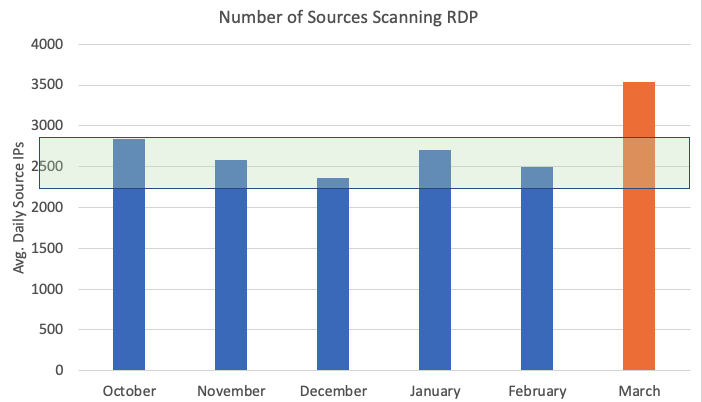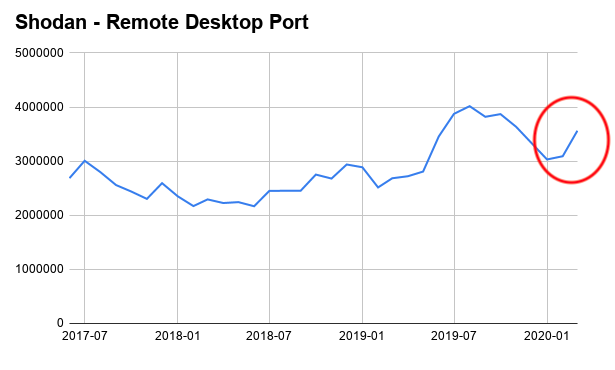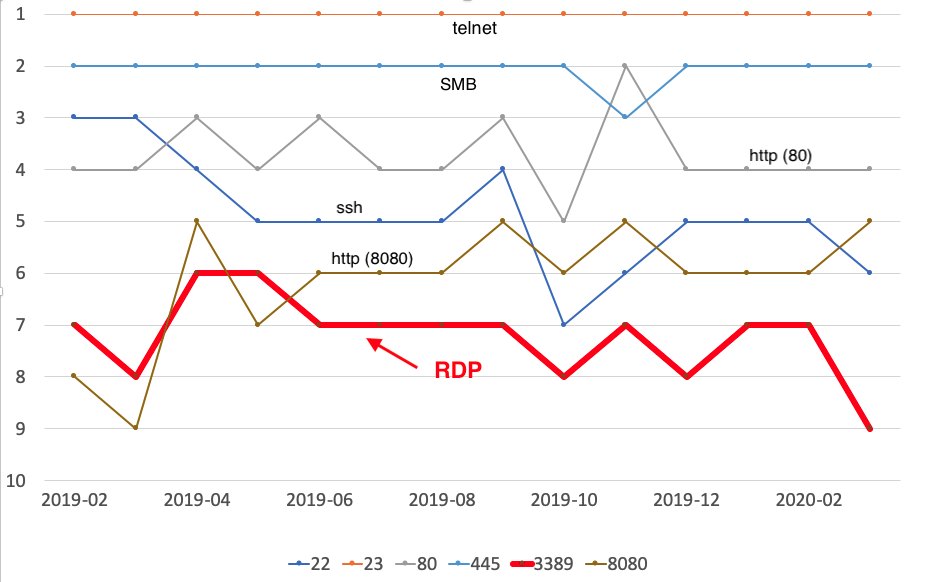Increase in RDP Scanning
Back in January, I published a post "Network Security Perspective on Coronavirus Preparedness." One of the items I pointed out was the need to plan for remote work, and how VPNs may present a resource constraint. As so often, some organizations ended up "winging it" last minute and ended up with less than optimal solutions.
At the end of March, Shodan posted that it had detected a marked increase in exposed RDP services [1]. The initially reported number was adjusted downward later, but there is still an increase in exposed RDP servers, which is attributed to organizations quickly enabling remote access.
RDP Exposure Measured by Shodan [1]
It should be noted that the initial, larger, increase in RDP exposure was due to the inclusion of IPv6. Some organizations may try to "hide" RDP on IPv6. But if Shodan can find you, so can the bad guys.
Services like RDP should not be exposed directly to the open Internet. If you do so, these services should be configured carefully. RDP has had several critical vulnerabilities in the past. One of the most common methods used to attack RDP services is various forms of password brute-forcing. Various underground web sites actively trade RDP passwords. RDP has had a rich history of vulnerabilities in the past. Patching RDP servers is critical.
Inspired by the Shodan post, I took a look at our data to see if we can detect an increase in scans for port 3389, the default RDP port. Port 3389 is a consistent "Top 10" port, and the Internet is saturated with RDP scans, which can make it challenging to detect change.
Selected Top 10 Ports
Investigating reports for RDP scans for the last few months, I noticed that the number of source IPs used to scan for port 3389 increased significantly. The increase in sources implies that the bad guys are investing more resources in scanning for port 3389.
For October through February, we saw about 2,600 source IPs scanning for port 3389 each day. In March, this number increased to 3,540, a significant increase (approx 5.5 std deviations).

Avg. Source IPs Scanning Port 3389 each day. Green bar: Std. Dev.
The increased interest in scanning port 3389 indicates that attackers are ready for some of the changes to network configurations as a result of increased remote access requirements. Sadly attackers do not give us a break. Instead, they are focusing on weaknesses that organizations are exposing now. Every single attack vector we have looked at these last few months has incorporated the Coronavirus crisis, and attackers are ruthless as usual in exploiting any weakness they can find.
For RDP: If you must expose it, please follow one of the guides to secure RDP. UC Berkley has a comprehensive and concise guide [2]. I fully understand that you may not be able to redesign your architecture right now. Substantial changes to remote access mechanisms always come with the risk of disconnecting yourself (yes, I have reconfigured VPNs while on the road, and luckily my wife was able to undo the damage I did to get me back in..).
Recognizing that coronavirus has caused organizations around the world to transition their workforce away from an office to the work-from-home environment and that many organizations lack the policies, resources, or training to enable their people to do so securely, SANS released the “Securely Working from Home” Deployment Kit on March 16. This free kit provides organizations with a step-by-step guide on how to rapidly deploy a training program for their remote staff. All training materials and resources necessary to secure a remote, multi-lingual workforce are included in the kit.
[1] https://blog.shodan.io/trends-in-internet-exposure/
[2] https://security.berkeley.edu/education-awareness/best-practices-how-tos/system-application-security/securing-remote-desktop-rdp
---
Johannes B. Ullrich, Ph.D. , Dean of Research, SANS Technology Institute
Twitter|




Comments